Rock Island ICU Nurse Struggling With Covid Impact at Work, Home
Ian Hutto is struggling to deal with the Covid-19 pandemic, both at work and home.
The 35-year-old native of Chicagoland is an ICU nurse at UnityPoint Health – Trinity in Rock Island. His wife, Annette, owns Cool Beanz Coffeehouse at 30th Street and 14th Avenue, Rock Island, and they’re raising their nine-month-old daughter, Lydia, while Ian also is studying for his master’s in nursing from University of Illinois-Chicago.
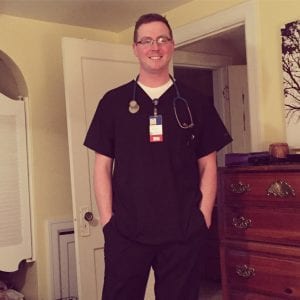
Ian Hutto is a registered nurse in the intensive care unit of UnityPoint — Trinity, Rock Island.
“It has been a stress like I’ve never felt in my life,” Ian said recently. “In a good and very bad way at the same time. It’s overwhelming; I am the type of person that has a feeling of missing out. I love to see my friends and I love to go out and do things. That’s my outlet, and I love to socialize. Having to quarantine and isolate has been very difficult.”
“It’s a pro for the fact, since this is the best time for me to be doing all this schoolwork, raising a child, because what else do I have to be doing?” he asked. “It’s a con, because I need somewhere to go vent, kind of let me decompress a little more, and my outlets to let me do that are much more limited now. It’s made it difficult; Annette and I have been dealing with it well.
“Luckily, I have a beautiful wife who supports me and helps me in every which way, and a beautiful child to come home to, even when I have my worst days, and I see her smiling at me,” Ian said. “That is an immense help, but life is not easy.”
The ICU at Trinity Rock Island has been close to full with Covid patients, as the Quad-Cities and the nation are experiencing a peak in hospitalizations due to the virus. The U.S. recently hit a record number of hospitalized Covid patients, at nearly 70,000 this weekend, outpacing previous highs of 60,000 in mid-April and late July, according to the COVID Tracking Project.
Genesis reported a doubling of hospitalized Covid patients (from 50 to 105) in less than a week, Nov. 4-10.
In the second week of this month, Iowa had the third-highest number of cases per 100,000 in the nation (behind the Dakotas), at 147.7, with
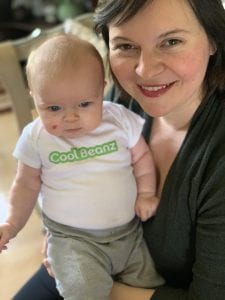
Annette Hutto, owner of Rock Island’s Cool Beanz, with her daughter Lydia.
Scott County tallying 286.4 per 100,000 that week, and 171.1 in Rock Island County. In contrast, New York City (once the country’s pandemic epicenter) averaged just 16.3 cases per 100,000 the same week, and the state of California had an average of 17.
New daily cases nationwide have skyrocketed from 88,831 on Oct. 31, to 181,801 on Nov. 13, according to the CDC. On Nov. 12, the COVID Tracking Project reported the number of people who were hospitalized with Covid nearly doubled nationwide in the past two weeks, and hospitalizations increased in 47 states.
Last week, the situation got so bad that both UnityPoint – Trinity and Genesis health systems issued stern public advisories about preventing Covid.
“Now more than ever, it is crucial for the entire community to understand what they do impacts everyone, and the challenges we are facing are very real and urgent,” Trinity said in its release. “The entire UnityPoint Health system is seeing an increase in Covid-19 positivity rates and hospitalizations.
“If the presence of Covid-19 in our communities is a marathon and not a sprint – then we are entering the hardest leg of this race to date,” said Robert J. Erickson, UnityPoint Health – Trinity President and CEO. “Our critical care resources are near maximum capacity and we need the community to do their part to get this virus under control by following the CDC recommended safety guidelines.”
With an average of 200 positive tests a day, UnityPoint Health – Trinity said everyone must “do their part in order to slow the spread and ease the strain on the healthcare system.”
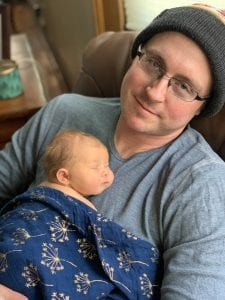
Ian with newborn Lydia in February 2020.
If about 10 percent of infections require a hospital stay, that would make for 20 new Covid admissions daily, “which is not sustainable when combined with the normal volume of patients requiring non-Covid related care, especially as we enter the winter months,” Trinity said. “Protect your family, your community, and your local health care workers by wearing a mask, washing your hands, staying home when you are sick, practicing social distancing and getting your flu shot.”
Hutto has been an ICU nurse since February 2017 and for the past 18 months has worked 13-hour weekend shifts, starting at 6:45 a.m. He agreed with the strong stances from local hospitals.
“They’re definitely more serious and strong-handed about it right now, which they should be,” Hutto said. “I think immediately, in our health field, we did a pretty good job of getting that information out right away – stopping visitors from coming, telling people to start wearing masks and social distancing, and doing all the correct things, and not going out.”
“There weren’t as many open ears at that time, because people weren’t listening or didn’t know what to do,” he said. “Now that people are serious about how this is getting and how bad it’s getting, we’re just reiterating. It’s what we’ve been saying for quite a while now. We just have to put it out there again and again.”
There were 25 new coronavirus deaths and 5,487 new cases reported in Iowa on Nov. 13. Over the past week, there were an average of 4,660 cases per day, an increase of 164 percent from two weeks earlier. As of Nov. 15, there have been at least 183,555 cases and 1,985 deaths in Iowa since the beginning of the pandemic, according to a New York Times database.
In Illinois, at least 191 new coronavirus deaths and 11,003 new cases were reported on Nov. 14. Over the past week, there has been an average

Robert Erickson is president/CEO of UnityPoint Health — Trinity.
of 12,146 cases per day, an increase of 110 percent from the average two weeks earlier.
As of Sunday morning, there have been at least 564,086 cases and 11,098 deaths in Illinois since the beginning of the pandemic, including 115 Covid-related fatalities in Rock Island County.
Hutto certainly has seen his share of deaths from the virus.
“It’s very stressful. Obviously, dealing with any death – which we’re all used to dealing with in the ICU – is never easy,” he said. “We’re all trained to do it, we all deal with it. We learn from each other; we talk about it. We work through it. But doing this through Covid, where families can’t come in and see their loved ones, and they’re isolated completely from them.
“Until those dying hours, then they can come in and be with them. It’s traumatic, for not only the families, but for us as well – seeing their faces and seeing how they react and deal with the process, it’s not easy,” Hutto said.
“Now that we understand the disease, that we can control the spread of it a little better, we understand we’re capable of doing it – we’ve been doing it for months now and a lot of us haven’t gotten sick,” Hutto said. From noon to 6 p.m., one visitor is allowed into a non-Covid patient room, he said.
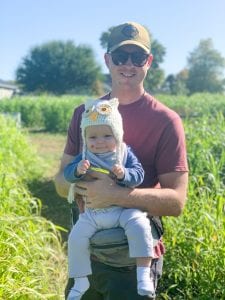
Ian Hutto with his daughter Lydia.
If the dying patient has Covid, the visitor must remain outside the room, where they can still see them through a window and talk by phone, he said.
When patients are treated and discharged, Hutto said “most people are scared straight about it.”
“Some people will never change, and we’re used to that in the ICU,” he said. “Not that they don’t want to change or can’t change. They’re just in a situation in life – socio-economically, substance abuse, whatever’s going on – they don’t have the help or ability to do better. But for the most part, people kind of see the light and are like, ‘This is something not to mess around with and I really wish I took it more seriously.”
Many people have said they tried to do their best, but got the virus anyway, Hutto said. “They’re put in a situation where they couldn’t help it and it wasn’t necessarily their fault either,” he said.
Getting into nursing to help people
Ian has been in the Q-C for 12 years, and after working several years for a moving company and UPS, he earned his associate’s in nursing from Black Hawk College in December 2016.
He and Annette grew up 20 minutes from each other (on the south side of Chicago) and went to rival Catholic high schools. He’s from Evergreen Park, Ill., and they met in the Q-C. She lived in Orland Park and graduated from Augustana in 2009. They got married in 2016.
At Trinity, Ian worked the night shift for over two years (7 p.m. to 7 a.m.), three times a week, plus every four weeks he picked up an extra shift. He says that helping people through some of the worst times they’ve ever experienced is gratifying.
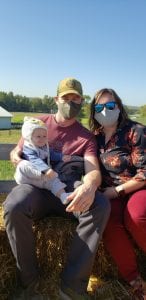
Ian and Annette Hutto, with their daughter Lydia.
“The ability to utilize my empathy and compassion on a regular basis is extremely cathartic,” Ian said in a 2019 interview at bhc.edu. “I need to exercise those characteristics to be happy, and nursing is all about both of them.”
He loves nursing became he feels naturally empathetic and compassionate with people.
“I want to listen to them and I really want to understand why people think a certain way,” Hutto said recently. “I think my hands-on abilities, my critical thinking skills, I work well under crisis and pressure. I think I’m more suited to be with people under those scenarios, actually help them through those situations.”
“I’m also much better at those acute moments in time, when I am dealing with those stressful situations with families,” he said. “Those are the worst times in their life and they’ve never experienced it. They don’t know what to do. I’m there to guide them and help them through it, and keep smiling, or just stay calm through it.”
“I keep my ears open for them and listen,” he said. “I’m lucky I am good at it and I’ve learned from some very special people I’ve gotten to work with.”
In Rock Island, they got their first Covid patients in March. “It was terrifying for a lot of us,” he said. “I took this position knowingly, that you’re going to deal with disease processes you don’t want to screw around with, you want to be careful – like tuberculosis, pneumonia. There are airborne things you worry about and think about.
“We were prepared for it, so when it came in, we know the proper procedures,” Hutto said. “They train us very well to know those things. At first, we did everything we were supposed to from the start, which was really good. I’m very proud of our hospital. There are little hiccups here and there, but I know our ICU has done a very good job.
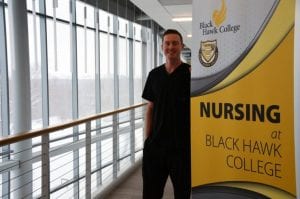
Ian earned his associate’s degree in nursing from Black Hawk College in December 2016.
“It was very scary for a lot of nurses, though,” he said. “A lot of them had a lot of anxiety. You could just feel the increase in worry, bringing it home and not knowing if you’re gonna get it, if you’re gonna bring it home to your family, your kids. So we always thought it could happen, but we have a lot of control over things. It’s not this new thing we don’t understand.”
“It definitely changed the feeling in the ICU,” Hutto said, noting there are two ICU units totaling 20 beds, and nursing staff is usually about 10 at a time. “We were on high alert, talking about where these patients were at.”
The increased anxiety went down by the summer, and it went away until this resurgence in the last few weeks, when it’s hit the staff and hospital really hard.
“Things are pretty tough,” he said. “Although everyone is dealing with it pretty well, it’s still difficult on us right now. We’re all being spread out.”
The unit is separated with a surgical ICU, which has a different ventilation system. When cases declined, they moved Covid patients to the medical ICU and the SICU served elective surgeries when those returned. Both ICU units are filled with Covid patients, Hutto said.
An overflow area up a floor, which is usually an observation area with 10 beds, has been about half filled with Covid patients, he said.
The previous peak in Trinity cases were in April into May, Hutto said. “People didn’t know how to take it seriously,” he said of the public. Summertime lowered the incidence, but now things are colder, people are forced inside and that’s what has sparked the spike in cases, Hutto said.
“I think it finally hit a point there was really no slowing it down, and we’re also in a very bad spot where human beings are complacent – they

Ian and Annette Hutto, with their daughter Lydia.
don’t like dealing with things for a very long time; it wears on them and they get sick of it,” he said. “You have half of America, 40 percent of America fighting it – opening things up , trying to fight masks, trying to argue about this consistently.
“At that point, there was no helping it, and people had to learn the hard way,” Hutto said. “We really shouldn’t have to.”
Before Covid, RNs wouldn’t always wear surgical masks, but they have been all the time since March. “If someone had a suspected disease, we’d quarantine them, put them in their room, label it and we’d know what to put on before entering that room,” Hutto said, noting they always wear gloves with patients. “We all have to have masks on and we were already crazy about cleaning stuff, but it’s a whole new level of wiping things down, making sure you’re cleaning what you’ve used.”
The ICU nurses didn’t have any cases among themselves for several months. With the new resurgence, a couple nurses got Covid, but they were exposed at home, Hutto said.
“A nurse helping her daughter move, and someone who was helping move them, a friend had it, ended up testing positive, so she tested positive after that,” he said. The infected nurses could recover for a week, and they could return to work while wearing a mask and keeping distance, Hutto said.
“Our nurses are coming back quicker because we’re already using the safety protocols and the measures that have prevented all of us from getting it,” he said. “We also need the workers very, very badly, so we want to make sure we have staff on hand. I’m kind of on the fence about
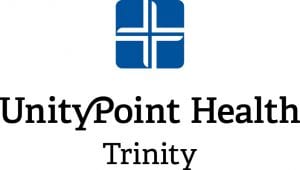
UnityPoint and Genesis both issued stern warnings about Covid this past week.
it, because there is a little anxiety about people coming back and possibly having the infection still and us not knowing.”
Most cases they see, patients get tested and are put in isolation until they get results, Hutto said. The minority of cases, they come in for other reasons and show Covid symptoms, and get tested positive.
The primary treatments include remdesivir, convalescent plasma and dexamethasone.
“I think we’re giving the treatments that will do the best for them, and most scientists around the world are saying we should utilize,” Hutto said. Positive cases are more common among elderly patients, people with diabetes and other underlying conditions.
“Even if you have some underlying lung disease, that definitely doesn’t help,” he said. “If you have COPD, if you have asthma, it’s gonna be bad. I’ve seen some people with lung disorders do better than other people who have diabetes or are very obese, out of shape and aren’t able to fight the disease process that much.”
Bitter politicization of Covid
The divisive politicization of Covid, across the country (from President Trump on down), has fueled the explosion of cases and hospitalizations.
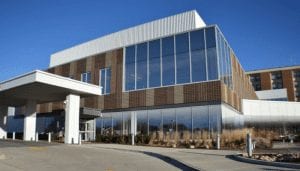
UnityPoint Health — Trinity hospital in Rock Island.
“From the majority of the nurses and health care workers, it’s extremely frustrating and aggravating,” Hutto said. “Everyone has differing opinions on the matter, and their ideas of what freedom is. When it comes down to keeping us safe and healthy, and putting a piece of fabric over your mouth, doesn’t seem like you should even question it.
“I get it – that it’s different and people don’t want to be told what to do,” he said. “But it’s just very arrogant and selfish, when people like to talk about, it’s getting their freedom taken away – I don’t think that’s a very good, healthy perspective to have. I don’t think anyone’s really sat and talked to them about what freedom really means. What we’ve had to fight through, with health crises.”
“If we don’t do the right thing – people want to back the military, but you should be backing your healthcare workers just as much because we’re trying to help you and teach you the best things to do,” Hutto said. “We’re not trying to hurt you in any way. It’s just very frustrating.”
Families have come in and asked him whether they really need to wear a mask.
“Yes, people are literally dying next door to us right now, on ventilators and their families can’t see them,” he said. “Yes, you should wear a mask.”
Being in Illinois, Hutto feels safer than in Iowa, reflecting differences in the governor’s actions over the year. “It’s kind of like witnessing the rift in America, the two political sides about it, literally in a small town,” he said.
“It is interesting seeing it too, and it’s aggravating because people are saying, ‘If you close down over here, I’m just gonna go over there, do what I want to do anyways, and then you’re gonna bring back whatever was getting worse over there, you’re gonna bring back here,” he said.
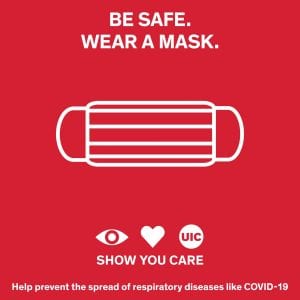
Healthcare providers (and the University of Illinois Chicago) urge everyone to wear a mask to stop the spread of Covid-19.
“In a pandemic, it does start from the top down, living from example – telling everyone what they should be doing,” Hutto said. “This is the worst time to have this crisis happen, with the leadership we have in this country. It’s unfortunate.”
Unlike a nation rallying together in wartime, against a specific enemy (like after 9/11), it’s harder to unite when battling an invisible, deadly virus – “out of sight, out of mind.”
“It’s very easy for people to just not think about it, or not care about it,” he said. “But if we had leadership that actually viewed the world for what it is, and understood how important it was for us to have science, and how far we’ve come along because of science – because of people in that industry and so many different varieties of ways, you should be able to talk to people and explain that even though we can’t see this thing that’s attacking us, we should be vigilant and stand up together against it.
“We should be doing the right things, even if we don’t know 100 percent, is this going to solve the problem or 100 percent help,” Hutto said. “It’s something I hope we do. It’s easy for people not to see, as humans fighting, but it needs to be recognized as just as important. It’s not only affecting our health, it is affecting our economy and the future of our country.”
His household has been extra stressful since Annette has had her business hurt by the pandemic, having first to close for months and offer just curbside pickup, and back closed again since Nov. 4. Because of Covid, she also moved back to her parents after her baby was born (in February) for a few months.
“She’s had to modify her business and it’s been extremely difficult,” Ian said. “It was nice when we opened up for a little more, but to be honest, it didn’t greatly increase anything. It didn’t increase her bottom line much, because people were still doing the right things and were still concerned about going out and spreading this. They didn’t want to sit in a restaurant.”
“It was good for a while; it brought back a little morale, to at least do that, but now we went back to the same way that it was, now we at least know what it is,” he said. “She has a plan set out; she understands the process. The curbside was doing well for what it is. It’s disappointing because we don’t want to be at this place, and no one does.”
It’s also opened other pathways, since Annette is opening a second location in a drive-through at Bent River Rock Island, 512 24th St., to open this week.
Trinity definitely has had to divert non-Covid cases to the University of Iowa and to OSF in Peoria.
“That risk is there, because you are possibly delaying care that they may need immediately,” Hutto said. “We understand if they’re not stable enough to be transported, we’re not going to transport them. But also, that might be to their detriment, because they’re not going to receive the treatment they might need right away. It’s happened very rarely, where we’ve had that circumstance. For the most part, they’re stable enough where we say, it’s unfortunate, you have to make this extra trip.”
“That is also traumatic at the same time too,” he noted. “You’re feeling horrible, you’re scared, and now you have to go to this other place that’s completely foreign and anyone who wants to come by you now has to travel as well. It’s very difficult on every aspect of the scenario.”
Back at school online
Hutto finished his bachelor’s degree last December, online with University of Illinois-Chicago (UIC), and is continuing with the same school for a master’s.
Since he got his bachelor’s, “it makes you a more well-rounded student,” he said. “You get to learn more about the analytics and managerial side of it, the administrative side of it. You don’t really get paid more. There are some hospitals that require you to have a BSN degree.”
“For the most part, you can have your same associate’s and bachelor’s and you’re doing the same bedside nursing, basically,” Hutto said. “I think it does a lot more. Getting a bachelor’s obviously costs more money, so it doesn’t make sense for every person’s situation, depending

The Quad-Cities is now among the top 10 hot spots in the United States for covid-19 spikes.
what they’re doing. But if you have the ability to do it, I think the future is going to bring the fact that we need to have a bachelor’s to work at any facility. That’s kind of what they’re saying.”
“All in all, it made me see things more all-encompassing, made me see the whole field a little better,” he said. “It really did make me a better nurse for sure.”
Hutto is studying for his master’s in nursing, with a teaching certificate, to become a nursing instructor. He started that with UIC in August and plans to finish in December 2021. It’s mostly online, and some in person, in downtown Moline, wearing masks and face shields. The degree will be an advanced generalist master’s in science, which also is half towards a nurse practitioner degree (Ian is an RN now).
His plan is to teach, ideally at Black Hawk. Annette also would like to get into teaching as well; she is starting an online program with the American College of Education.
“The beautiful thing about nursing I’ve discovered – obviously it’s needed,” Hutto said. “I mean health care isn’t gonna go anywhere. And you have so many different paths, different ways to go with it.”
“It’s hard to become stale and stagnant,” he said. “If it wasn’t for my practice and my work, that I truly enjoy working with students and I enjoy teaching my patients. I really am a science and math nerd. My entire life growing up, I enjoyed those subjects a lot more.”
“Being able to think about the physiology and biology part of nursing, and the numbers and math, and tell people about that – I think I bring a good sense of direction for them,” Hutto said. “I can teach them in a positive way and make them excited about it and understand why it is cool and important for you to know these things.”
Like other healthcare organizations, adequate staffing remains an issue for UnityPoint Health – Trinity. An increasing number of team members are off work with Covid associated with community spread. “The more this virus spreads in the community, the more challenging it is to maintain a healthy care team,” Trinity said.
“Additionally, nurses and providers are physically and mentally exhausted and need the communities help to lighten the load by taking simple precautions to stay healthy,” its release said.
UnityPoint Clinic is only testing patients with symptoms consistent with Covid, so if you have symptoms, Trinity asks people not to go to an emergency department.
Instead, it asks:
- Call your primary care provider FIRST for guidance. If you are unable to reach them, move on to step two.
- Reserve your spot at one of UnityPoint’s walk-in clinics or visit without an appointment.
For more information, visit www.unitypoint.org/quadcities/coronavirus-updates-closings.aspx.









